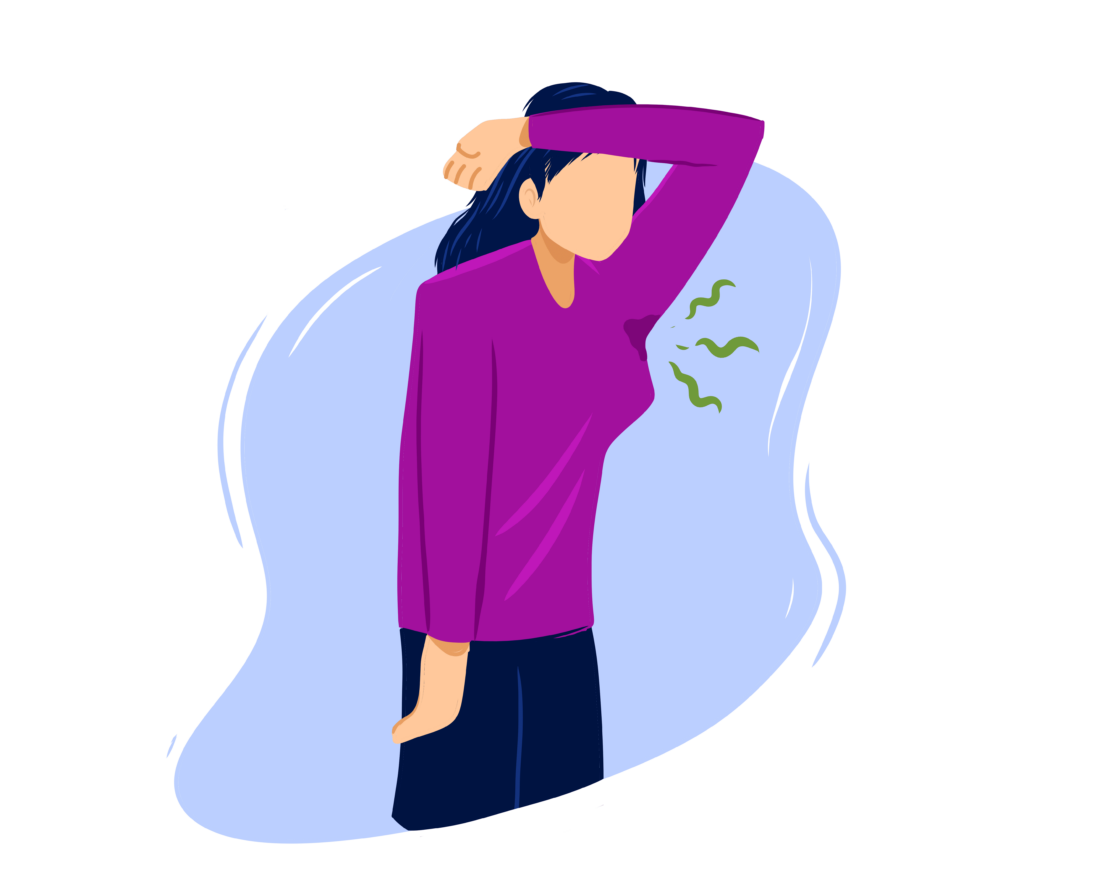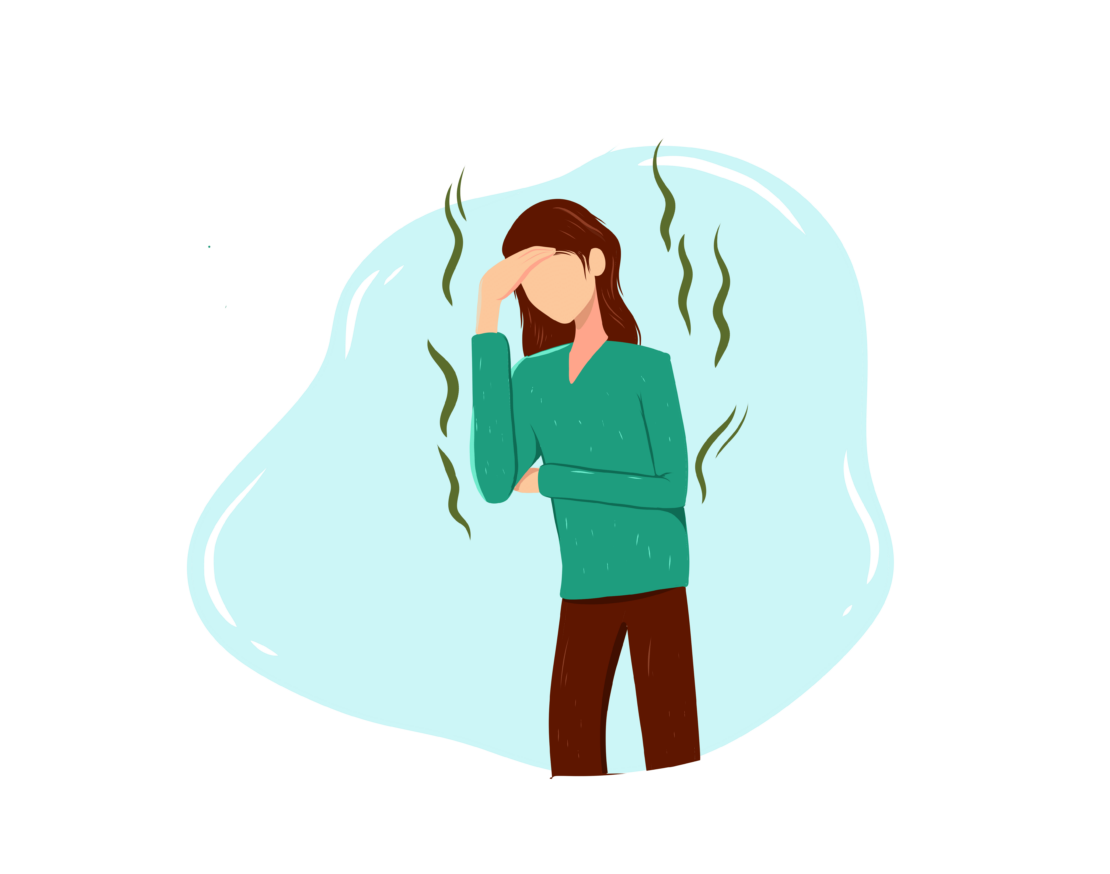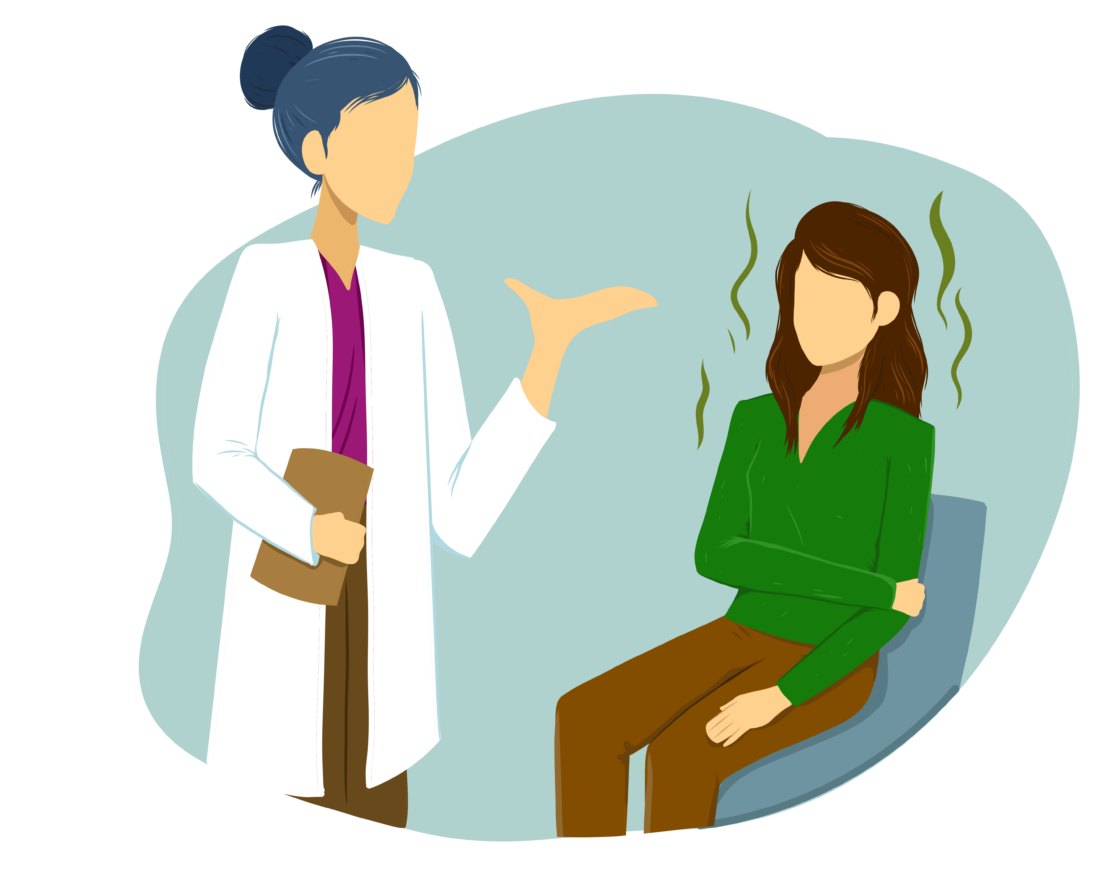Dealing with menopause can be a confusing journey for many women, with the range of hormonal changes affecting their bodies in different ways. One of the unexpected changes that can occur is increased body odour.
With the decrease in oestrogen levels, your body might undergo a boost in sebum production and a reduction in sweat production, leading to this change. Not all women experience this symptom, and it can occur at any stage—before, during, or after menopause.
However, understanding the reasons behind these changes in body odour during this crucial phase can help deal with any discomfort and concern.
How is Body Odour Connected to Menopause?
Body odour changes are affected by the drop of oestrogen levels that happens during the menopausal period. It is often paired up with hot flushes and night sweats as these symptoms cause excessive sweating for women.
The severity of these vasomotor symptoms, like hot flushes and night sweats, has a direct relationship with body odour. Simply put, the more intense these symptoms become, the more sweat your body produces. This excess sweat fuels the bacteria on your skin, which in turn generates the unpleasant odour.
A study from the Wynn Institute for Metabolic Research in London found that menopause itself can lead to changes in the composition of our sweat, specifically affecting lipids and lipoproteins from apocrine sweat glands .
It’s not just due to ageing; these changes are directly linked to menopause and play a key role in how our body odour is produced. Essentially, when the sweat from these glands is broken down by bacteria on our skin, that’s when we get the distinctive smell of body odour.

What’s Causing Body Odour During Menopause?

Body odour during menopause is caused by the decline in oestrogen; this ends up leaving our bodies with more testosterone which is produced in small amounts by the ovaries. This hormonal shift can make your sweat more appealing to bacteria, which in turn leads to body odour.
However, that’s not all. The hormonal imbalance that comes with menopause can also affect your sweat glands. When your oestrogen takes a dip, your body can start to produce more sebum – that’s the oily stuff on your skin. This change, combined with other symptoms like hot flashes and night sweats, can really amplify that body odour issue.
Did you know the oils in your sweat – a mix of steroids, lipids, and proteins – are actually what lead to body odour, or as it’s more formally known, bromhidrosis? How it works is that the bacteria on your skin break down these oils, which in turn creates the not-so-pleasant smell we know as body odour.
An extensive study by the Tabriz University of Medical Sciences looked into what happens in your body during menopause. As your oestrogen levels drop , serotonin receptors in a part of your brain called the hypothalamus get all fired up.
Now, the hypothalamus is like your body’s thermostat – it controls temperature regulation. So when these serotonin receptors are activated, it can throw off your body’s thermostat, leading to increased body temperature and more sweating.
And more sweat, as we know, can lead to more body odour. So that’s how menopause can play a part in changing your body odour.
Does Every Sweat Gland Produce Body Odour?
No, it’s only the apocrine sweat gland that produces the body odour whenever we sweat.
Your body has two types of sweat glands – eccrine and apocrine. Eccrine glands are the ones that help keep your body cool. They do this by releasing sweat, which evaporates and cools you down.
On the other hand, apocrine glands get going when your sex hormones kick into high gear during puberty. These glands produce a thick, protein-rich substance. Now, this substance doesn’t actually smell bad when it’s first produced. But once it meets the bacteria on your skin it becomes more pungent and we experience body odour.
That is why, as oestrogen levels drop, women in menopause develop symptoms like excessive sweating which then translates to body odour. Let’s explore more about the major sweat glands.


Apocrine Sweat Gland
Apocrine sweat glands, also called odoriferous sweat glands, are known for producing foul-smelling sweats.They are large, branched glands, mostly located in specific areas of your body like under your arms and around your groin. Women will also have them around the labia majora, and men around the scrotum and prepuce.
Apocrine sweat glands are also present around your nipples, in the areolar tissue. While these glands are present from the moment you’re born, they don’t actually start doing their secretory function until you hit puberty. Once those hormones kick in, these glands get to work producing sweat that can smell.
Eccrine Sweat Glands
The majority of the body is covered in thin skin, which has sweat glands as well as hair follicles, hair arrector muscles, and sebaceous glands. All skin appendages, aside from sweat glands, are absent from the thick skin that covers the palms and soles of the hands and feet.
Eccrine sweat glands are the simpler, coiled, tubular types of sweat glands and they’re pretty much all over your body (with the highest concentration actually on the bottoms of feet!)
Most of your body is covered in what’s called ‘thin skin’ (though this has nothing to do with the ‘thickness of your skin). It’s a term that refers to skin that has features like sweat glands, hair follicles, hair arrector muscles, and sebaceous glands.
But then there’s thick skin, which you’ll find on the palms of your hands and the soles of your feet. Unlike thin skin, thick skin doesn’t have any skin appendages, except for sweat glands. So, the only game in town for your palms and soles when it comes to sweating are these eccrine sweat glands!
Treatment for Menopausal Body Odour
While menopausal body odour can seem daunting, it’s important to remember that there are viable solutions to manage it. There’s a whole range of therapies, treatments, and natural remedies at your disposal.
In this section, we’ll walk through some effective strategies, from medical interventions like Hormone Replacement Therapy (HRT) to lifestyle modifications and natural remedies. Let’s explore these options to help you navigate this transition more comfortably.
As a front-line approach, Hormone Replacement Therapy can effectively help manage the hormonal imbalance during menopause, often reducing associated symptoms like excessive sweating and body odour. By replacing the diminishing oestrogen, HRT can help regulate the body’s sweat and sebum production, thereby addressing the changes in body odour.
Are you wondering if Hormone Replacement Therapy (HRT) could be your answer? Why not chat with us at the Online Menopause Centre – our friendly doctors and nurses are always ready to help. They can guide you through your choices and what comes next. We’re all about making this journey easier for you.
Prescription Antiperspirants
For those experiencing excessive sweating, prescription antiperspirants can be a practical solution. These contain higher concentrations of active ingredients compared to over-the-counter options, and can be applied to various parts of the body to control excessive sweat and associated odour.
Antibacterial Skin Cleansers
Utilising antibacterial skin cleansers can help reduce the number of odour-causing bacteria on your skin. These cleansers are specifically designed to fight the bacteria that break down sweat and cause body odour, offering an added layer of protection.
Botox Injections
While not a first-choice solution for many, Botox injections can be a consideration for extreme cases. By blocking the nerves that trigger your sweat glands, Botox can reduce excessive sweating and the resulting body odour.
Natural Remedies:
- Dietary Changes
What we eat can impact our body odour. Consuming a balanced diet rich in fruits, vegetables, and whole grains, while reducing intake of spicy foods, caffeine, and alcohol can help manage body odour. - Regular Exercise
While it may seem counterintuitive, regular exercise can help regulate your body’s temperature and reduce excessive sweating and body odour over time. Plus, it’s a great stress-reliever. - Good Hygiene Practices
Regular bathing, especially after exercise, helps remove the sweat and bacteria on your skin. Using antibacterial soap and wearing breathable fabrics can also assist in managing body odour. - Herbal Supplements
Certain supplements, like sage and black cohosh, have been claimed to help reduce menopausal symptoms, including excessive sweating and body odour. However, it’s essential to consult with a healthcare provider before starting any supplement regimen.
Anything that will help you reduce your perspiration will undoubtedly help you get rid of body odour. For instance, serotonin-norepinephrine reuptake inhibitors (SNRIs), like venlafaxine, and selective serotonin reuptake inhibitors (SSRIs), like fluoxetine, boost serotonin in the synaptic gaps and relieve hot flashes.
Remember, it’s important to consult with a healthcare professional to understand the best approach for your individual needs and circumstances. It’s a team effort, and together, you can effectively manage menopause symptoms, including body odour.
What is the Proportion of Women Who Experience Body Odour During Menopause?

Body odour frequently coexists with hot flashes and night sweats during the menopause. Hot flashes are common in menopausal women (75%–80% of them), thus we may estimate that 4 out of 5 women also suffer body odour as a symptom.
A study published in the International Journal of Behavioral Medicine highlighted that women in the perimenopausal stage often suffer from severe hot flashes and night sweats.
It goes without saying that the likelihood of experiencing these symptoms, including body odour, is even higher for postmenopausal women.
It’s important to note that menopausal symptoms can extend well into old age for some women, lasting much longer than commonly believed. So, understanding and managing these symptoms becomes even more crucial during this prolonged period.
Is there a Relationship Between Body Odour and a Specific Menopause Stage?
Body odour and the onset of the hot flashes and night sweats, two early signs of menopause, are intimately correlated.
According to a study published in the International Journal of Behavioral Medicine, women in the perimenopausal stage, particularly those who remain in this stage for two years or more, face a significant risk of experiencing intense physical symptoms. These symptoms can include bothersome night sweats, persistent back pains, and frequent headaches.
Such symptoms are intrinsic to this stage of life and not solely a result of ageing. As a result, it is highly advisable to actively seek the advice and consultation of a healthcare professional to mediate these symptoms and to relieve you from inconvenience along the way.

When Should You Consult a Doctor?

While it’s perfectly normal to experience some changes in body odour during menopause, there are times when it’s smart to get professional advice. If you’re noticing a really strong, persistent smell, or if you’ve tried various remedies and nothing seems to do the trick, that’s when you might want to reach out to a professional.
Here at the Online Menopause Centre, we’ve got practitioners ready to help you navigate these changes.
In some rare, more serious cases, significant changes in body odour might be a sign of conditions like Trimethylaminuria (also known as Fish Odour Syndrome), liver disease, certain types of cancer, or even fungal infections. In particular, if your body odour has a fruity scent (which could indicate diabetes) or smells like bleach (which could indicate kidney problems), you should speak to a medical professional right away.
So if something doesn’t smell quite right, don’t wait. Reach out to us , we’re here to support you through these changes and help you find effective solutions. After all, we’re all in this together!
